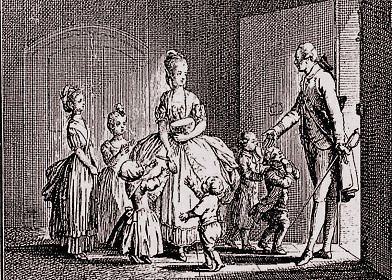The Sorrows of Young Werther (09) by J.W. von Goethe

The Sorrows of Young Werther (09)
by J.W. von Goethe
27 May 1771
I find I have fallen into raptures, declamation, and similes, and have forgotten, in consequence, to tell you what became of the children.
Absorbed in my artistic contemplations, which I briefly described in my letter of yesterday, I continued sitting on the plough for two hours. Toward evening a young woman, with a basket on her arm, came running toward the children, who had not moved all that time. She exclaimed from a distance, “You are a good boy, Philip!” She gave me greeting: I returned it, rose, and approached her. I inquired if she were the mother of those pretty children. “Yes,” she said; and, giving the eldest a piece of bread, she took the little one in her arms and kissed it with a mother’s tenderness. “I left my child in Philip’s care,” she said, “whilst I went into the town with my eldest boy to buy some wheaten bread, some sugar, and an earthen pot.” I saw the various articles in the basket, from which the cover had fallen. “I shall make some broth to-night for my little Hans (which was the name of the youngest): that wild fellow, the big one, broke my pot yesterday, whilst he was scrambling with Philip for what remained of the contents.” I inquired for the eldest; and she had scarcely time to tell me that he was driving a couple of geese home from the meadow, when he ran up, and handed Philip an osier-twig. I talked a little longer with the woman, and found that she was the daughter of the schoolmaster, and that her husband was gone on a journey into Switzerland for some money a relation had left him. “They wanted to cheat him,” she said, “and would not answer his letters; so he is gone there himself. I hope he has met with no accident, as I have heard nothing of him since his departure.” I left the woman, with regret, giving each of the children a kreutzer, with an additional one for the youngest, to buy some wheaten bread for his broth when she went to town next; and so we parted. I assure you, my dear friend, when my thoughts are all in tumult, the sight of such a creature as this tranquillises my disturbed mind. She moves in a happy thoughtlessness within the confined circle of her existence; she supplies her wants from day to day; and, when she sees the leaves fall, they raise no other idea in her mind than that winter is approaching.
Since that time I have gone out there frequently. The children have become quite familiar with me; and each gets a lump of sugar when I drink my coffee, and they share my milk and bread and butter in the evening. They always receive their kreutzer on Sundays, for the good woman has orders to give it to them when I do not go there after evening service. They are quite at home with me, tell me everything; and I am particularly amused with observing their tempers, and the simplicity of their behaviour, when some of the other village children are assembled with them.
It has given me a deal of trouble to satisfy the anxiety of the mother, lest (as she says) “they should inconvenience the gentleman.”

The Sorrows of Young Werther (Die Leiden des jungen Werther) by J.W. von Goethe. Translated by R.D. Boylan.
To be continued
fleursdumal.nl magazine
More in: -Die Leiden des jungen Werther, Goethe, Johann Wolfgang von

